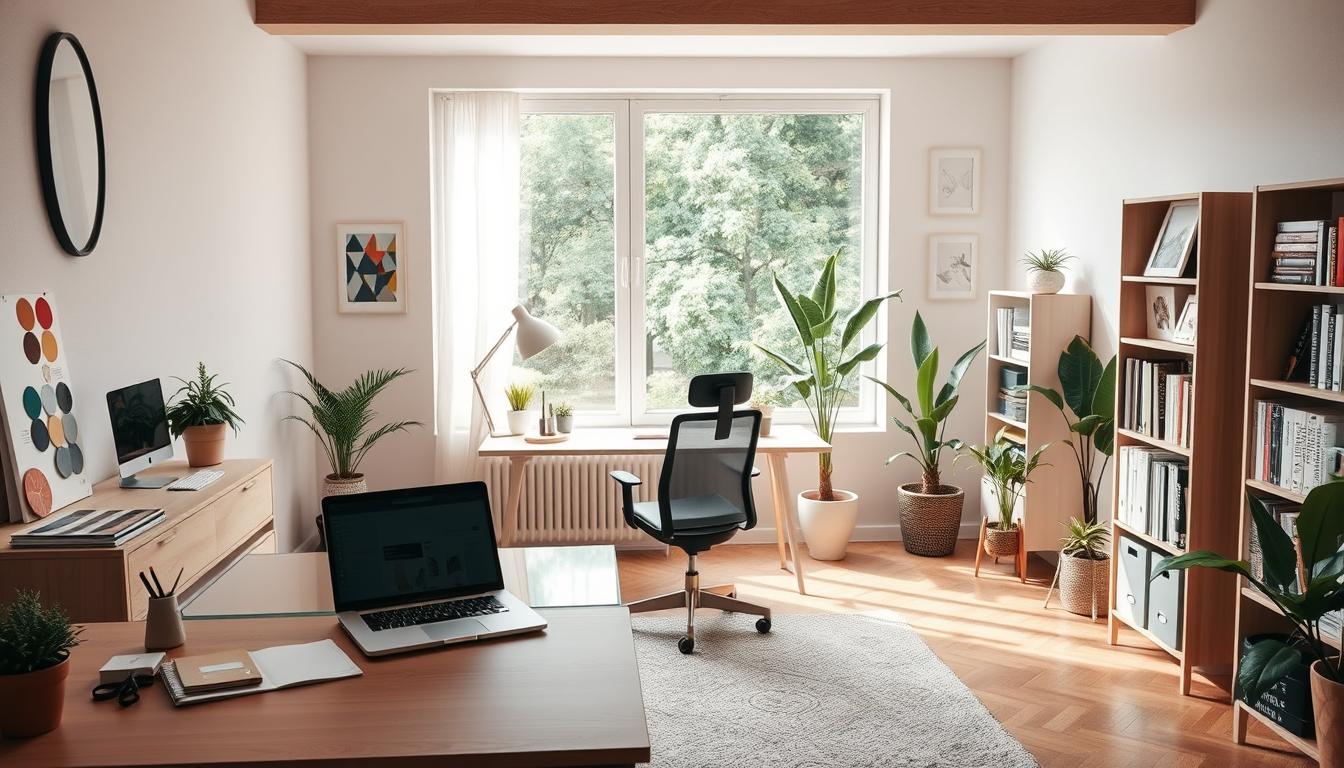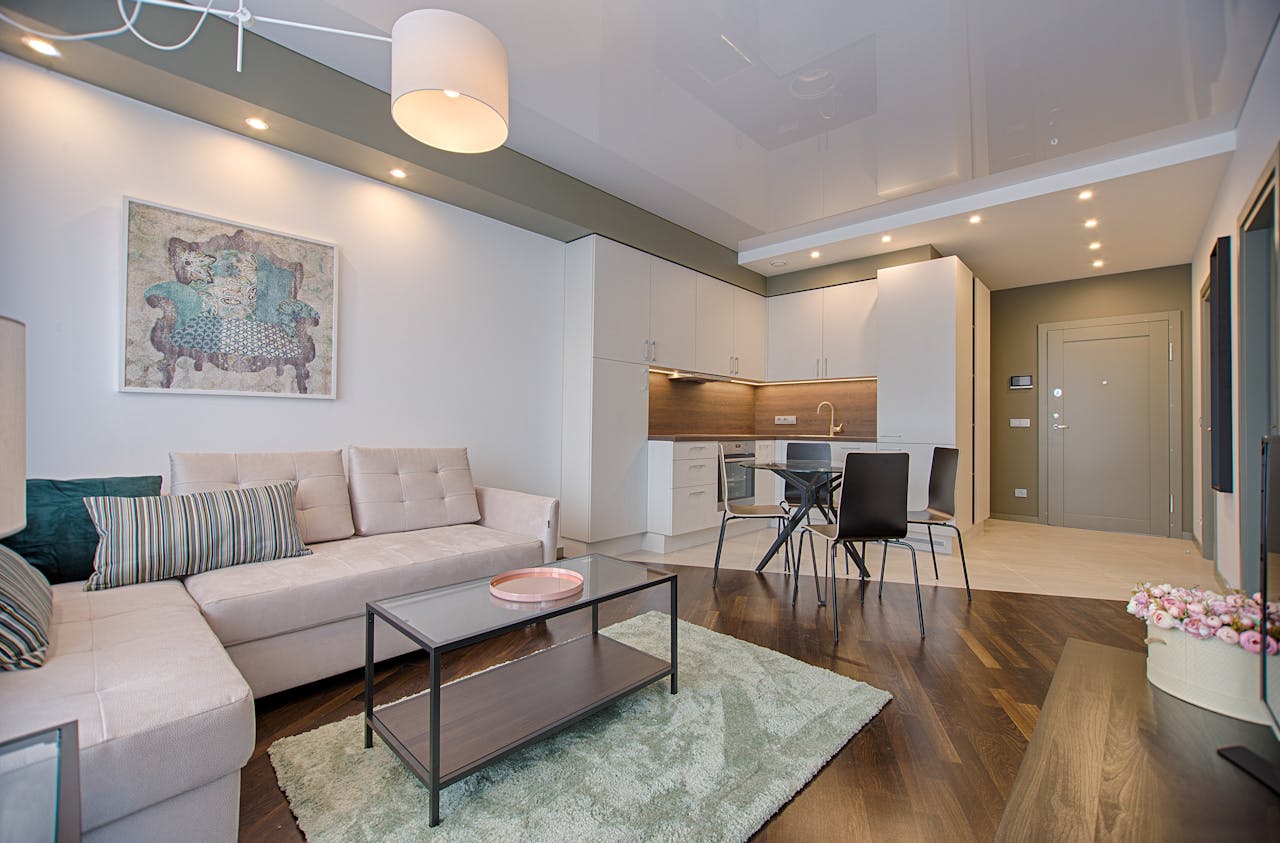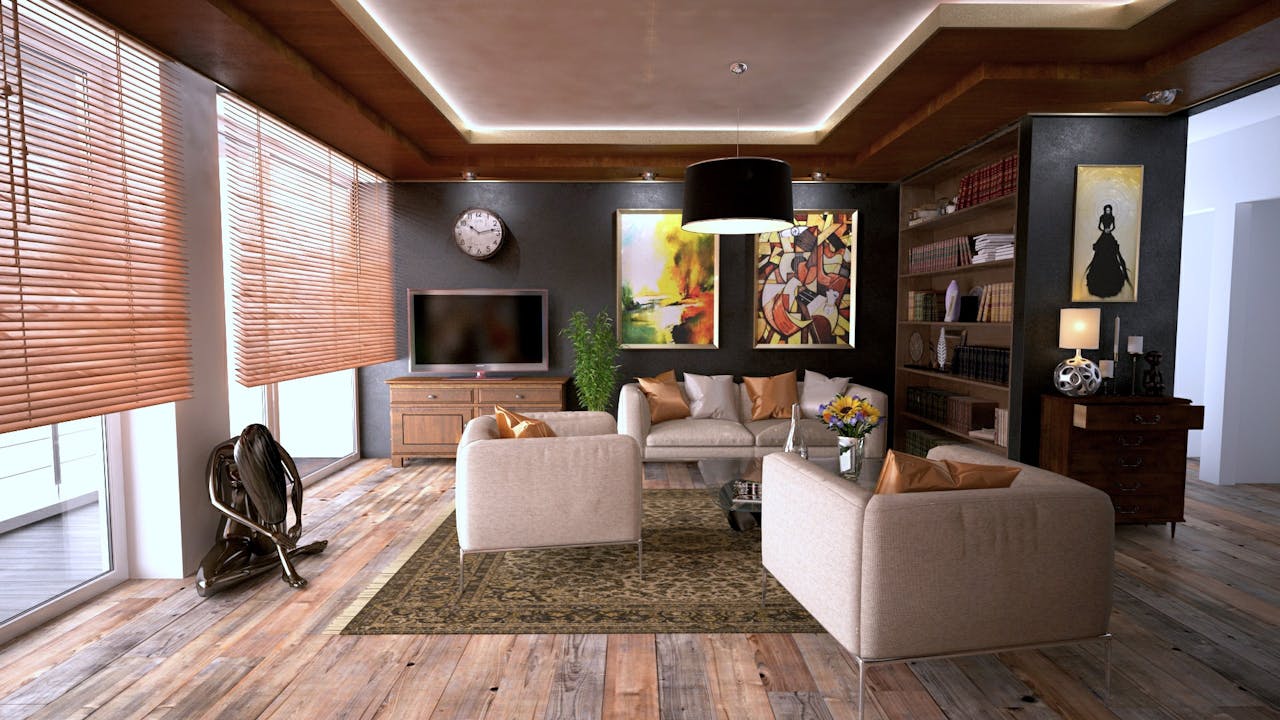The way we decorate our homes is changing fast, thanks to technology. Virtual interior design services are now a hit, offering a cheap and easy way to decorate. This is different from the old ways of decorating.
Now, with digital home decor solutions, you can design your home from anywhere. This big change is making it easier than ever to get expert advice on decorating.
In this guide, we’ll look at the good things about online home interior design. We’ll also see how it works. You’ll get all the info you need to change your home’s look.
Key Takeaways
- Convenience of designing from anywhere
- Affordability compared to traditional design services
- Access to professional design advice
- Variety of digital tools for visualization
- Personalized design solutions
What is Online Home Interior Design?
Online home interior design has changed how we decorate our homes. Now, we can find many design experts and services online. This makes it easy to decorate our homes from anywhere.
Definition and Overview
Online home interior design uses digital tools to design homes from afar. It lets homeowners get professional help without meeting in person.
Virtual interior design services let homeowners work with designers online. They use special software to make designs that homeowners can see before making changes.
Benefits of Online Design Services
Online home interior design has many benefits. One big plus is convenience. Homeowners can talk to designers whenever it’s best for them, without long meetings.
Another great point is affordability. Online design is often cheaper than traditional services. This means more people can afford professional design.
- Access to a wide range of design professionals
- Cost-effective solutions
- Personalized design plans
Using remote interior design consultation services, homeowners get a design that fits their needs. It’s a personalized experience.
How Online Interior Design Works
In the world of online home interior design, the first step is key. We start by learning what the client wants and needs. This includes their style, budget, and project details.
Initial Consultation Process
The first meeting is where we get to know the client. We talk about their lifestyle, design likes, and budget. This can be through a form or a video call.
We ask about their favorite colors, furniture, and the look they want. This makes sure we get their vision right.
We also talk about the project’s details, like time and money. Being clear here helps avoid problems later. Our aim is to create a design that fits their unique needs.
Design Proposal and Revisions
After we know everything, we make a detailed design plan. This includes mood boards, color schemes, furniture, and layouts. We share this plan with the client for their thoughts.
Getting feedback is a big part of online design. We work with the client to make changes until they’re happy. This back-and-forth makes sure the design is just right.
Finalization and Implementation
When the plan is set, we start making it happen. We find the furniture and decor, and work with contractors if needed. We make sure everything matches the client’s dream and our plan.
To show how it works, let’s look at the steps in online interior design:
| Stage | Description | Key Activities |
|---|---|---|
| Initial Consultation | Gathering client information and preferences | Questionnaire, video call, discussing budget and timeline |
| Design Proposal | Creating a detailed design concept | Mood boards, color schemes, furniture selection, layout plans |
| Revisions | Incorporating client feedback | Reviewing design proposal, making adjustments |
| Finalization and Implementation | Overseeing the installation process | Sourcing furniture, coordinating with contractors, installation |
By following this process, we give our clients a digital home decor solution. It turns their space into a beautiful and useful area.
Top Online Interior Design Platforms
The online interior design world is both fierce and fresh. Virtual design solutions have changed how we decorate our homes. Now, it’s easier and more tailored to our tastes.
Major Players in the Market
Many platforms are out there, each with its own twist. Fiverr, AI Home Design, and Fulhaus are among the most known. They’re praised for their virtual design solutions and easy-to-use sites.
Fiverr offers a variety of design services at low prices. AI Home Design uses AI to suggest designs just for you. Fulhaus provides a full design journey, from start to finish.
Comparison of Features and Pricing
When picking a platform, it’s key to look at what they offer and how much it costs. Here’s a quick rundown of the big names:
| Platform | Key Features | Pricing |
|---|---|---|
| Fiverr | Wide range of design services, freelancer-based model | Starting at $5 per service |
| AI Home Design | AI-driven design recommendations, user-friendly interface | $29 – $99 per design package |
| Fulhaus | Comprehensive design experience, personalized service | $99 – $299 per room design |
User Experience and Reviews
User happiness is crucial for online design platforms. We checked out what people say about them. Mostly, they’re happy with how easy it is to use and the quality of designs.
In short, the best online interior design sites offer a variety of services and prices. Think about what you need, how much you can spend, and what others say. This will help you choose the right web-based home styling platform.
Choosing the Right Online Designer for Your Style
Finding the right online interior designer is key to a great home design. It’s about matching your style with the designer’s. This ensures your home looks good and shows who you are.
Identifying Your Design Aesthetic
Knowing your design style is the first step. It’s about what colors, furniture, and feel you like. Think about:
- Your lifestyle and how you use your living spaces
- The architectural style of your home
- Your favorite colors and textures
- The ambiance you wish to create in your home
Emily Henderson, a famous interior designer, said, “Your home should tell the story of who you are, and be a place where you feel completely relaxed.”
“Design is not just about the aesthetic; it’s about creating a space that functions for your lifestyle.”
Matching Designers to Your Preferences
After knowing your style, find a designer who can make it real. Here’s how to match:
| Designer’s Specialty | Your Preference | Matching Criteria |
|---|---|---|
| Modern Minimalist | Clean lines, simple decor | Portfolio showcasing minimalist designs |
| Traditional | Classic furniture, rich colors | Experience with classic designs, client testimonials |
| Eclectic | Mix of styles, unique decor | Portfolio diversity, ability to blend styles |
Look at their portfolio, read what clients say, and understand their process. This ensures they’re a good fit for you.
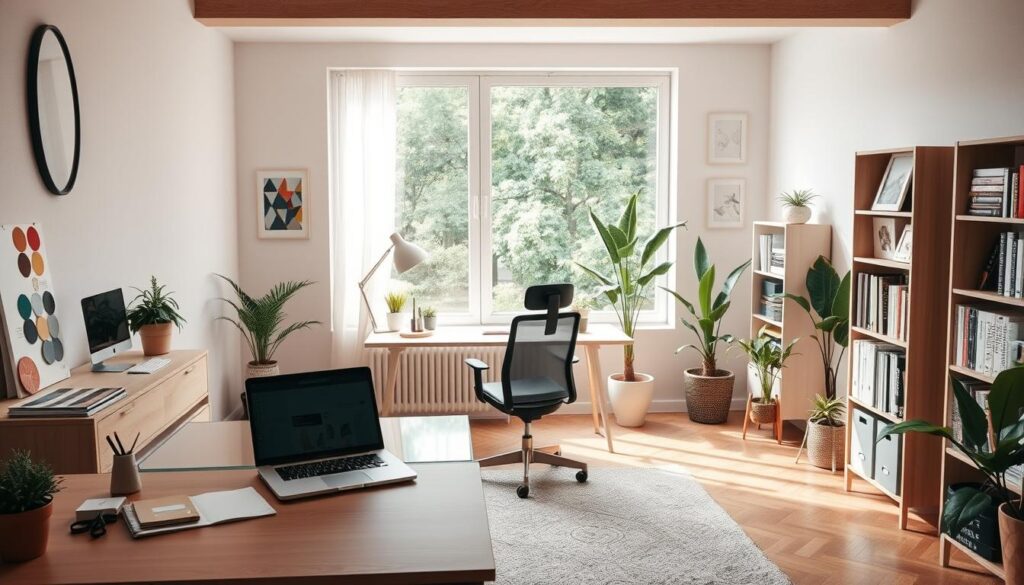
By identifying your style and choosing the right designer, you’ll get a home that’s truly yours. It will reflect your personality and meet your needs.
The Role of Technology in Interior Design
Technology has changed how we see and use our homes. It’s making interior design more personal and easy to get. As tech grows, so does the design world.
Virtual Reality and Augmented Reality in Design
Virtual Reality (VR) and Augmented Reality (AR) lead the tech change in design. VR technology lets clients dive into a virtual space. They can see their future home before it’s built.
AR technology adds digital info to real spaces. Clients can see how furniture fits in their homes without moving anything.
These tools make design better and happier for clients. They cut down on the surprises of old design ways. For example, AR lets clients try out different room layouts easily.
Utilizing 3D Modeling for Visualization
3D modeling is key in today’s design. It makes detailed, three-dimensional models of spaces. Designers use these to show clients exactly what they’ll get.
For instance, 3D models can show how lighting changes a room’s feel. They also show how materials and textures affect the look. This detail is crucial for meeting client expectations.
| Technology | Description | Benefits |
|---|---|---|
| Virtual Reality (VR) | Immersive virtual environment | Realistic preview of designed space, enhanced client experience |
| Augmented Reality (AR) | Overlays digital info onto real world | Visualize furniture and decor in actual space, reduces guesswork |
| 3D Modeling | Detailed 3D models of spaces | Better visualization, informed decision-making, improved client-designer communication |
As we use more tech, interior design is changing fast. For more on the latest in design tech, check out Planner5D’s blog on interior design technology. The future of design is digital, and it’s exciting to see what’s coming.
Budgeting for Online Home Interior Design
To get the home interior design you want online, setting a budget is key. Online design is easy and often cheaper. But, knowing the money side is vital for a good project.
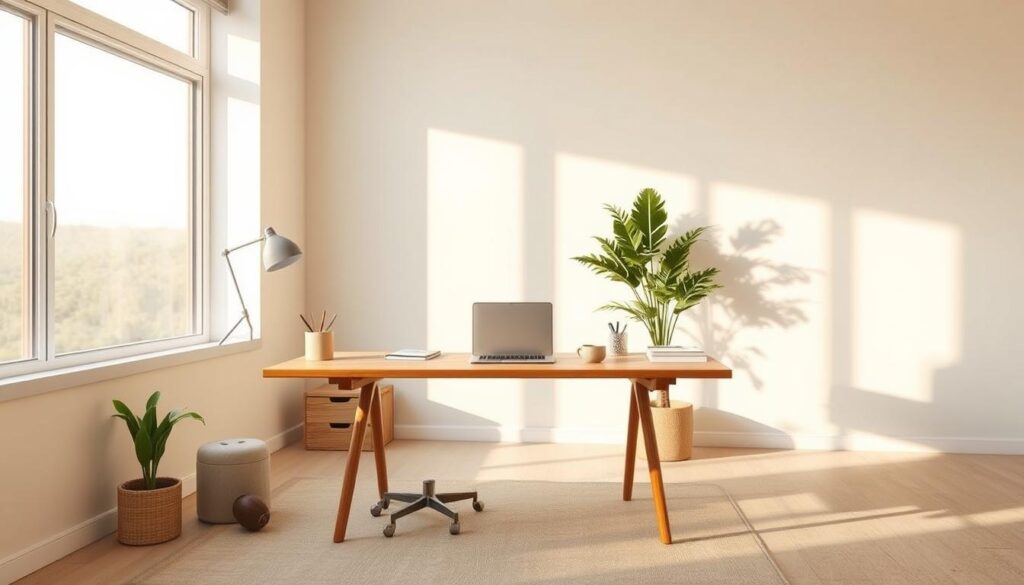
Setting a Realistic Budget
When planning your online home design budget, think about your project’s size. This includes the area, number of rooms, and design changes. Knowing what you want helps you use your money wisely.
First, look up the average costs for online design services. Prices change based on the platform, designer’s experience, and services. Some sites offer deals to save money, while others charge for each service.
Hidden Costs to Consider
When budgeting for online design, remember hidden costs. These might be for furniture, decor, or materials your designer suggests. Also, think about renovation or repair costs that might pop up during design.
- Costs for buying furniture or decor
- Fees for extra consultations or changes
- Expenses for making design changes, like painting or new floors
Knowing these costs early helps you make a detailed budget. This way, your online home design project goes smoothly and successfully.
DIY vs. Professional Online Design
Choosing between DIY and professional online home interior design is a big decision. Both options have their good and bad sides, which we’ll look at here.
DIY online design is popular because it’s easy to do and doesn’t cost much. There are many online tools and resources that let people design their homes themselves.
Pros and Cons of Both Approaches
Let’s dive into the advantages and disadvantages of DIY versus professional online design.
- DIY Online Design:
- Pros: It’s cheaper, flexible, and lets you be creative.
- Cons: You might not get expert advice, which could lead to bad design choices.
- Professional Online Design:
- Pros: You get expert advice, personalized service, and better design.
- Cons: It can cost more, and there’s a chance you won’t like the final result.
Interior design expert
“The key to successful online interior design, whether DIY or professional, lies in understanding the client’s needs and preferences.”
Here’s a comparison of DIY and professional online design:
| Aspect | DIY Online Design | Professional Online Design |
|---|---|---|
| Cost | Generally lower | Can be higher |
| Expertise | Limited to online resources | Professional training and experience |
| Personalization | Dependent on individual’s design skills | Tailored to client’s preferences |
When to Seek Professional Help
DIY online design works well for simple projects. But, for complex projects or if you want expert advice, it’s best to hire a professional online designer. They can help ensure your project goes smoothly.
In conclusion, whether to go DIY or hire a professional depends on your needs, budget, and what you prefer. Knowing the pros and cons of each can help you make the right choice for your online home interior design project.
Client Testimonials and Success Stories
We’ve seen the positive impact of virtual interior design on homeowners. Our clients share success stories and testimonials. They highlight how our online services work well.
Real-Life Transformations
Many clients have seen big changes in their homes. For example, one client said:
“The online room design services completely revamped our living room, making it a cozy retreat that we never want to leave.”
These changes aren’t just about looks. They also make spaces more functional and livable.
Positive Experiences with Online Design
Our clients love working with us online. Here are some key points from their testimonials:
- Personalized Service: Clients love the personal attention they get during the design process.
- Expertise: Our team’s design knowledge ensures clients get top-notch advice that fits their needs.
- Convenience: The ease of virtual design is a big plus. It lets clients design their homes from home.
These positive experiences show the value of our online services. They lead to happy and beautiful homes for our clients.
Common Challenges in Online Home Design
The rise of web-based home styling has brought new challenges. These include miscommunications and space constraints. Understanding these challenges is key for a successful design experience. We’ll look at these common issues and how to overcome them.
Addressing Miscommunications
Miscommunications can happen without face-to-face talks in online design. It’s important to be clear and detailed in your talks with the designer.
Using visual aids like mood boards or photos of your space can help. This ensures you and the designer are on the same page.
- Clearly articulate your design preferences and expectations.
- Use online tools or platforms that facilitate real-time communication.
- Regularly check-in with your designer to address any questions or concerns.
Dealing with Space Constraints
Space constraints are a big challenge in home design. Online designers must work with the measurements and layouts you provide. Accurate measurements and detailed floor plans are key.
Using 3D modeling or virtual reality tools can also help. They let you see the space and make adjustments before it’s done.
| Challenge | Solution |
|---|---|
| Inaccurate Measurements | Double-check measurements, use precise tools |
| Limited Space | Utilize vertical space, multi-functional furniture |
| Complex Layouts | 3D modeling, virtual consultations |
Tips for Successful Online Design Projects
For online design projects to succeed, clear communication and a well-organized plan are key. When you’re working on an online home interior design project, knowing what makes it successful is crucial.
Communicating Your Vision Effectively
Good communication is the foundation of any successful online design project. To make sure your vision is understood and brought to life, you must clearly share your ideas and preferences with your designer.
Here are some tips to improve communication:
- Be clear and concise about your design preferences and expectations.
- Use visual aids like mood boards or Pinterest boards to illustrate your style.
- Provide detailed measurements and information about your space.
- Regularly check-in with your designer to address any questions or concerns.
Staying Organized Throughout the Process
Keeping things organized is vital for a smooth online design project. This means managing communications, design proposals, and any changes.
To stay organized, consider these strategies:
- Create a dedicated folder or document for your project communications and files.
- Set clear milestones and deadlines with your designer.
- Keep a record of all design decisions and feedback.
- Use project management tools or apps to track progress.
By following these tips, you can ensure a successful online home interior design project that meets your expectations.
| Tips | Benefits |
|---|---|
| Clear and concise communication | Ensures accurate understanding of your design vision |
| Using visual aids | Helps designers understand your style and preferences |
| Regular check-ins | Addresses questions and concerns promptly |
| Staying organized | Ensures smooth project execution and timely completion |
Future Trends in Online Home Interior Design
Online home interior design is set to get even better. New technologies and changing what people want are driving this change. The internet has already made decorating homes easier and more personal.
Technological Advancements
Virtual reality (VR) and augmented reality (AR) are changing how we design rooms online. They let homeowners see their designs come to life in a real way. This makes choosing designs easier.
Shifts in Consumer Preferences
What people want is changing too. They’re looking for designs that are green and fit their unique style. Online design services are now offering eco-friendly choices and custom designs.
As online design keeps improving, we’ll see even more cool ideas. This will mix technology and design in new ways. Homeowners and designers will get to make spaces that are not just pretty but also useful and good for the planet.

